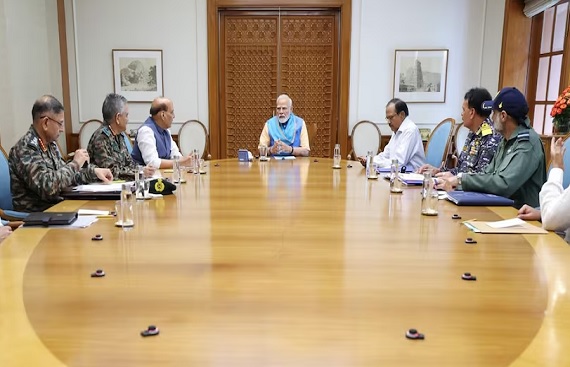India Warns Global Powers of Decisive Strikes Against Pakistan's Terror Infrastructure
By
siliconindia | Monday, 12 May 2025, 04:12 Hrs

- Operation Sindoor launched on May 7 to target Pakistani military and terror infrastructure.
- PM Modi told US Vice President JD Vance that India’s response would be more forceful, stronger, devastating.
- India struck eight key Pakistani military sites including radar stations and air bases.
In the wake of the deadly terrorist attack in Pahalgam on April 22, India has communicated to several global capitals, including Washington, that its military responses to any Pakistani provocation will be swift, stronger, and more devastating than ever before, according to senior government sources.
The communication followed the launch of Operation Sindoor on May 7, India’s most assertive counteroffensive in recent years, targeting Pakistan’s terror and military infrastructure. Sources said India conveyed clearly to its international interlocutors that there should be no ambiguity about its resolve to act decisively against cross-border terrorism originating from Pakistani soil.
Prime Minister Narendra Modi himself issued a stern warning during a call with US Vice President JD Vance on May 9, stating that India’s response to Pakistani aggression would be 'more forceful, stronger, and devastating'. The call came amid a rapidly escalating military confrontation between the two nuclear-armed neighbors.
“In all our messages post the Pahalgam attack, we were crystal clear if Pakistan fires, we will fire back. If they stop, we stop. But every action from them will be met with a more punishing response”, a senior source said.
India’s retaliation included precision strikes on at least eight major Pakistani military installations, including air defence systems, radar stations, and command centres. Targets included Rafiqui, Murid, Chaklala, Rahim Yar Khan, Sukkur, and Chunian bases. Additionally, radar installations at Pasrur and Sialkot aviation base were destroyed using high-precision munitions, causing significant damage, sources revealed.
These strikes came in response to a failed Pakistani attempt to hit 26 Indian military installations, including air force bases in Udhampur, Pathankot, and Adampur, during the night of May 9–10. India’s counteroffensive swiftly followed on the morning of May 10, signaling New Delhi’s zero-tolerance stance toward any aggression.
As the conflict escalated, the Director General of Military Operations (DGMO) of Pakistan reached out to his Indian counterpart to request an immediate cessation of hostilities. Within two hours of this communication, Foreign Secretary Vikram Misri announced that both sides had agreed to halt all military actions across land, air, and sea with immediate effect.
Sources added that Pakistan, alarmed by the scale and precision of India’s strikes, also reached out to the United States seeking an 'off-ramp' to de-escalate tensions. Following this, US Secretary of State Marco Rubio called Indian External Affairs Minister S. Jaishankar to convey that Islamabad was ready for a truce.
India had already briefed the US after the April 22 Pahalgam attack. During that period, Modi, then in Saudi Arabia, received a call from US President Donald Trump who expressed solidarity and support.
Throughout the episode, Indian officials reiterated that equating India the victim with Pakistan the perpetrator was unacceptable. “Even-handedness is not going to be tolerated anymore”, a senior source said, emphasizing that New Delhi would no longer accept diplomatic ambiguity in matters of terrorism.
The government’s message through Operation Sindoor was unequivocal: no terror haven inside Pakistan is safe anymore, and India reserves the right to strike deep inside enemy territory when provoked.
